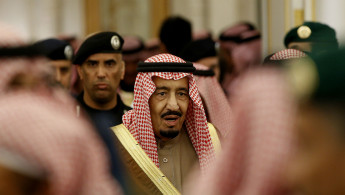Saudi Arabia withdraws $26.7bn from reserves
Saudi Arabia drew down 100 billion riyals ($26.7bn) from its general monetary reserve between February 2014 and January 2015, official figures show.
The country's monetary agency, Sama, which issued the figures, does not give reasons for fluctuations.
However, a sharp drop in oil prices, increased expenditure on security and defence, aid to Egypt and salary increases ordered by King Salman upon taking the throne are among the most important items to consider.
Ali al-Jafari, an economic expert, said that the Saudi financial situation remains strong, with more than 730 billion riyals ($195bn) in Sama's reserves.
Further reserve funds will also likely be drawn down to cover the expenses of Operation Decisive Storm in Yemen, Jafari added.
"This depends on oil prices, currently ranging between $55 and $60," he told al-Araby. "If no additional interest charges are imposed, the withdrawal will take place, but it will not be big, because the military operations are not expected to last long."
He said that it was difficult to estimate the costs of the war, with no specific figures published regarding the military operation.
"We also don't know how long this operation will last, but it currently does not cost the state much because all the weapons used are available. Things, however, might change if the military operations drag on, and in the event of a ground offensive - which remains unlikely at the present time."
Saudi Arabia paid two months of bonus salary to state employees in the wake of Salman's accession. Riyadh also pledged $4bn in aid to Egypt at an economic summit in Sharm al-Sheikh over the weekend.
Sama serves as a sovereign wealth fund in Saudi Arabia. It is believed that most of its assets are backed by the US dollar, especially US Treasury and G7 bonds.
Despite the slump in the oil prices, Saudi Arabia is currently benefiting from the rising dollar in the balance of payments.
Reuters earlier cited the London-based Capital Economics, saying: "In view of the current oil price, which is less than $60 per barrel, it is almost certain that Saudi Arabia will face a double deficit in the budget and current account balances."
Saudi Arabia recently increased its oil production to more than 10 million barrels per day, in what was described as a step to retain its global customers and expand the base of Saudi oil buyers.
Asem Arab, the head of the national committee of consultancy offices in the Council of Saudi Chambers, said the withdrawal from the monetary funds was predictable, because of the military operations.
He stressed, however, that Saudi Arabia was able to restore the monetary surplus to its previous level and more.
This is an edited translation from our Arabic edition.



